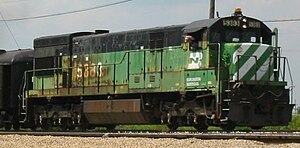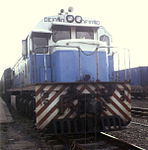GE U30C
| GE U30C | |||||||||||||
|---|---|---|---|---|---|---|---|---|---|---|---|---|---|
 Burlington Northern U30C operating at the Illinois Railway Museum in 2004 | |||||||||||||
| |||||||||||||
| |||||||||||||
| |||||||||||||
| |||||||||||||
The GE U30C is a six-axle locomotive built by General Electric from 1966 to 1976. With 600 units sold, the U30C proved to be a viable alternative for customers who were unable to purchase SD40s from Electro-Motive Diesel (EMD) due to production backlog. Throughout its ten-year production span, the U30C was known for reliability issues concerning its electrical system. However, most railroads were assured of the reliability of the GE Model 752 DC traction motor and began to place orders for U30Cs starting in 1966. When production ended, the last U30Cs carried pre-Dash 7 specifications, which would be carried in its replacement, the GE C30-7.
The U30C served customers of all kinds, from mining to general freights, coal trains, and even as a power source unit for the Department of Transportation's subway-car test tracks in Pueblo, Colorado before a connection from the commercial electric power grid could be established (Cudahy 1979).
Not to be outdone in the freight sector, GE produced a passenger version of the locomotive, the GE U30CG. The U30CG only sold six units for the Atchison, Topeka & Santa Fe Railway.
When most U30Cs were being retired due to old age and mechanical or electrical problems, General Electric initiated a rebuild program where older Universal Series locomotives would be upgraded with the latest technology and fuel-saving systems. GE would then strip the locomotive down to its frame and engine and completely rebuild the locomotive with new components. When completed, the unit would receive a new designation: GE C30-S7R (R for Rebuilt frame of traded-in locomotive). In the later years, the rebuild frame was discontinued, and a brand-new frame would be used, re-designating the locomotive as GE C30-S7N (N for New frame). The only external difference was a large vent on the fireman's side ahead of the engine compartment. The final variation came with the discontinued frame of the Universal series and instead, using GE C40-8 kits. This new model also featured a microprocessor, officially designating this locomotive as GE C30-S7NMP.
A variant of the U20C export locomotive was known as the U30C. This version is unrelated to the U30C built for North America.
Original owners
[edit]| Owner | Quantity | Numbers | Notes |
|---|---|---|---|
| Atchison, Topeka and Santa Fe Railway | 6 | 400-405 | model U30CG |
| Atlantic Coast Line Railroad | 4 | 3021-3024 | #3021 was the first U30C built. |
| Burlington Northern Railroad | 180 | 5300-5394, 5800-5839, 5900-5944 | 5800-5805, 5900-5911 new as 5300-5305 (1st) and 5353-5364. |
| Colorado & Southern (Chicago, Burlington & Quincy) | 4 | 890-893 | All sent to Burlington Northern. Same numbers. |
| Chesapeake and Ohio Railway | 13 | 3300-3312 | |
| Chicago and North Western Railway | 7 | 930-936 | 934 was wrecked and rebuilt into a U34CH in 1978. |
| Chicago, Milwaukee, St. Paul and Pacific Railroad (Milwaukee Road) | 8 | 5651-5658 | |
| Chicago, Rock Island and Pacific Railroad (Rock Island) | 18 | 4582-4599 | XR Series |
| Delaware and Hudson Railroad | 12 | 701-712 | |
| Detroit Edison | 11 | 007-012, 018-022 | |
| Ferrocarril del Pacifico | 8 | 401-408 | |
| Kaiser Steel (Eagle Mountain Railroad Mine Division) | 5 | 1030–1034 | Ballasting Sand added to the frame to increase weight (considered the heaviest U30Cs ever built). |
| Louisville and Nashville Railroad | 79 | 1470–1499, 1534–1582 | #1499 was presented in an XR Series paint scheme. |
| Missouri Pacific Railroad | 35 | 25-29, 960-983, 3329-3334 | |
| Norfolk and Western Railroad | 3 | 8000-8002 | |
| Pennsylvania Railroad | 5 | 6535-6539 | All inherited by Penn Central, same numbers. Later inherited by Conrail with same numbers, later renumbered 6835-6839. |
| Reading Railroad | 5 | 6300-6304 | All inherited by Conrail, renumbered 6579-6583, later 6840-6844. |
| Soo Line Railroad | 10 | 800-809 | |
| Southern Railway | 5 | 3800-3804 | High short hood |
| Southern Pacific Railroad | 37 | 7900-7936 | Ballasting Sand added to the frame to increase weight. |
| Union Pacific Railroad | 150 | 2810–2959 | #2851 was delivered with a fiberglass nose. |
| United States Department of Transportation | 1 | 1 |
Preservation
[edit]• Burlington Northern #5383 is preserved and operational at the Illinois Railway Museum[1]
• Burlington Northern #5802 is preserved and on display in Gilette, Wyoming.[2]
• DOTX #001 is preserved at the Pueblo Railroad Museum in Pueblo, Colorado.[3]
• Reading #6300 is preserved at the Reading Railroad Heritage Museum in Hamburg, Pennsylvania.[4]
• VLIX #1497 (ex-L&N 1497) is preserved at the Southern Appalachia Railroad Museum in Oak Ridge, Tennessee, awaiting restoration.[5]
• VLIX #9009 (ex-DEEX #009) is preserved at the Southern Appalachia Railroad Museum in Oak Ridge, Tennessee, awaiting restoration.[6]
Images
[edit]-
Colorado and Southern No. 890 GE U30C
-
Tanazania Zamba Railway Authority GE U30C At Mlimba Station
-
Ferrocarril del Pacífico U30C during delivery to Mexico, 1969
See also
[edit]References
[edit]- ^ "Burlington Northern 5383". Illinois Railway Museum. Retrieved 2024-03-09.
- ^ "BN 5802". www.rrpicturearchives.net. Retrieved 2024-03-09.
- ^ "RailPictures.Net Photo: DOTX 001 Department of Transportation GE U30C at Pueblo, Colorado by Craig Walker". www.railpictures.net. Retrieved 2024-03-09.
- ^ "RCT&HS Roster–Locomotives". www.readingrailroad.org. Retrieved 2024-03-09.
- ^ "VLIX 1497". rrpicturearchives.net. Retrieved 2024-03-09.
- ^ "VLIX 9009". www.rrpicturearchives.net. Retrieved 2024-03-09.
- Cudahy, Brian J. (1979), Under the Sidewalks of New York, The Stephen Greene Press, ISBN 0-8289-0352-2
- Diesel Era Staff (March–April 1994). "General Electric's U30C". Diesel Era. Vol. 5, no. 2. pp. 6–22, 38–45.
- Marre, Louis A. (1995). Diesel Locomotives: The First 50 Years: A Guide to Diesels Built Before 1972. Railroad Reference Series. Waukesha, Wisconsin: Kalmbach Publishing. ISBN 978-0-89024-258-2.
External links
[edit]- Thompson, David. GE U30C Original Owners



